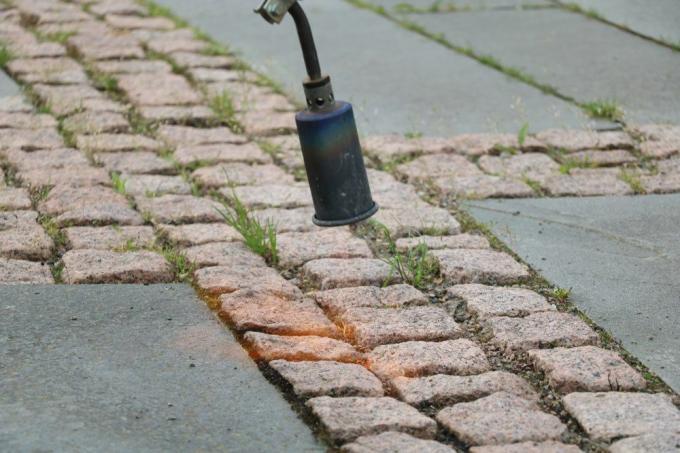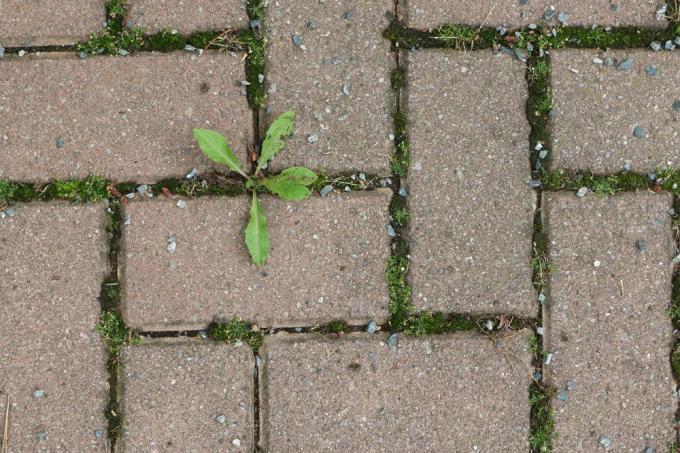
table of contents
- Vinegar as a weed killer
- Acetic acid in the garden
- Use only in exceptional cases
- Optimize effect
- Environmentally friendly alternatives
Vinegar is a natural product through and through. With its fine acidity, it spices our dishes and makes expensive chemical cleaners superfluous when cleaning the house. The news that it should also effectively destroy weeds should fill every environmentally conscious citizen with joy. But is this food really just as useful and harmless in the bed as in a prepared salad? If you check the facts carefully, you will hardly find anything that speaks for you as a weed killer.
Vinegar as a weed killer
Many hobby gardeners shy away from chemical herbicides and look for a natural alternative. The common household types of vinegar or The more concentrated vinegar essence seems to be such an alternative, because it is a natural product with no chemical additives. When it comes to user-friendly application, this home remedy is convincing in several ways:
- the remedy is unbeatably cheap
- the application is simple
- will possibly diluted and poured over the weeds
- Acid draws moisture from the leaves
- the unwanted herb burns
- this can then easily be plucked from the earth
- Safe for children and pets

But what does nature say about this supposedly environmentally friendly product? The fact that vinegar for combating weeds on paved surfaces has long been considered undesirable by the legislature makes people sit up and take notice.
Acetic acid in the garden
No question about it, this home remedy can be used extremely effectively and environmentally friendly when cleaning the house. However, if you critically question its use in the garden, you will encounter a number of disadvantages, not all of which are harmless:
- The effect of vinegar does not last long
- the application must be repeated frequently
- Roots are not destroyed
- Weeds sprout again
- Acid doesn't just damage the weeds
- other sprayed plants also die
If you only used small amounts of vinegar, the soil could withstand the acid and biodegrade. But the frequent applications in higher concentration, as is the case with the use of vinegar against weeds, bring the life of the soil upside down. These soil areas are not suitable for the cultivation of desired plants for a long time.
tip: If you were to use the household remedy salt as a weed killer instead of vinegar essence, that would be just as fatal. This also damages the soil, even more seriously and for a longer time than vinegar.
Is the use of vinegar prohibited on paved surfaces?
All types of vinegar and the highly concentrated vinegar essence were long considered to be pesticides, even when used diluted, provided they were used to destroy plants. This meant that their use on paved surfaces was banned.
The latest case law no longer classifies vinegar as a pesticide and thus removes it from the ban. Although a court decision has allowed its use in the private sector, the fact remains that the acetic acid can only be biologically degraded to a limited extent. In addition, rainwater cannot seep away well on paved surfaces and takes vinegar residue with it on its way to the sewer system. That is not what sewage treatment plants want.
Environmental protection agencies are therefore still sticking to the ban and see the use of vinegar against weeds on sidewalks and garage driveways at least one violation of “good professional practice” in Plant protection.
Use only in exceptional cases
Vinegar should be completely avoided from paved surfaces and it has no business in a vegetable patch anyway. In addition, it should be checked carefully for each application whether its use is still acceptable. However, this home remedy should always remain an exception. The following should also be noted:
- Spray directly on the plants from a short distance
- Vinegar can be applied even more precisely with a brush
- best in spring and summer
- on young plants, even before sowing
- use only in small quantities
- additionally remove the seed heads by hand
- annual herbs are sure to disappear
- do not spray when it is windy
- Be careful with essences
- Do not breathe vapors; Protect hands with gloves
tip: Add a few more splashes of washing-up liquid to the vinegar solution. The surfactants it contains destroy the wax layer on the leaves, from which the vinegar solution would simply roll off.
Optimize effect
The acetic acid contained in household vinegar takes a few days to damage the leaves of the plants. So that the use of the not entirely environmentally friendly agent was not in vain, you should wait to control weeds until the weather forecast announces a few dry days.
- Acetic acid sticks better to the leaves
- is not washed off by the rain
- Solar radiation intensifies the destructive effect
Large plants can be plucked out by hand beforehand or at least cut back to a minimum. A smaller amount of acetic acid is sufficient for the remaining residues.
tip: Boil the vinegar solution and spray it on the weed plants while it is still hot. The heat does its part in the destruction and makes the remedy even more effective.
Environmentally friendly alternatives
If, on the one hand, you have a heart for the environment in your chest and, on the other hand, simply cannot arouse a burning love for certain herbs, alternatives are needed to eliminate them. Fortunately, you don't have to look long for it. The following options are allowed:
- Scald with hot water
- Infrared devices that generate heat up to 1,000 ° C
- Flame burners destroy parts above ground
- Grout scrapers or wire brooms are ideal for paved surfaces
- High-pressure cleaners also do a good job here
- weed regularly by hand

Another harmless remedy: prevention
If weed plants don't get a chance to conquer large areas of the garden, the use of weed killers becomes superfluous. Here's how to make it hard for weeds to show up:
- through suitable Ground cover
- around plants mulch
- Cover free areas with weed control
- Mow lawns regularly
- so prevent inflorescences from unpleasant plants
- first lay out foil, then plaster




